Understanding Cultural Competencies in Healthcare: Focus on Hispanics
VerifiedAdded on 2023/06/04
|8
|1619
|194
Report
AI Summary
This report explores the cultural competencies necessary for healthcare providers to effectively serve the Hispanic community. It highlights the unique cultural beliefs, values, and behaviors of Hispanics, including the importance of family, fatalism, and traditional health practices. It identifies cultural factors that can create barriers to healthcare access, such as language differences and decision-making processes. The report also discusses the risks organizations face when they fail to understand these cultural nuances, leading to unmet healthcare objectives and health disparities. It emphasizes the need for healthcare providers to acknowledge and respect Hispanic cultural values to improve healthcare delivery and outcomes. The report concludes by stressing the significance of cultural sensitivity in healthcare and the need for providers to consider language, family involvement, and traditional practices when treating Hispanic patients. Desklib provides this assignment solution and many more resources for students.
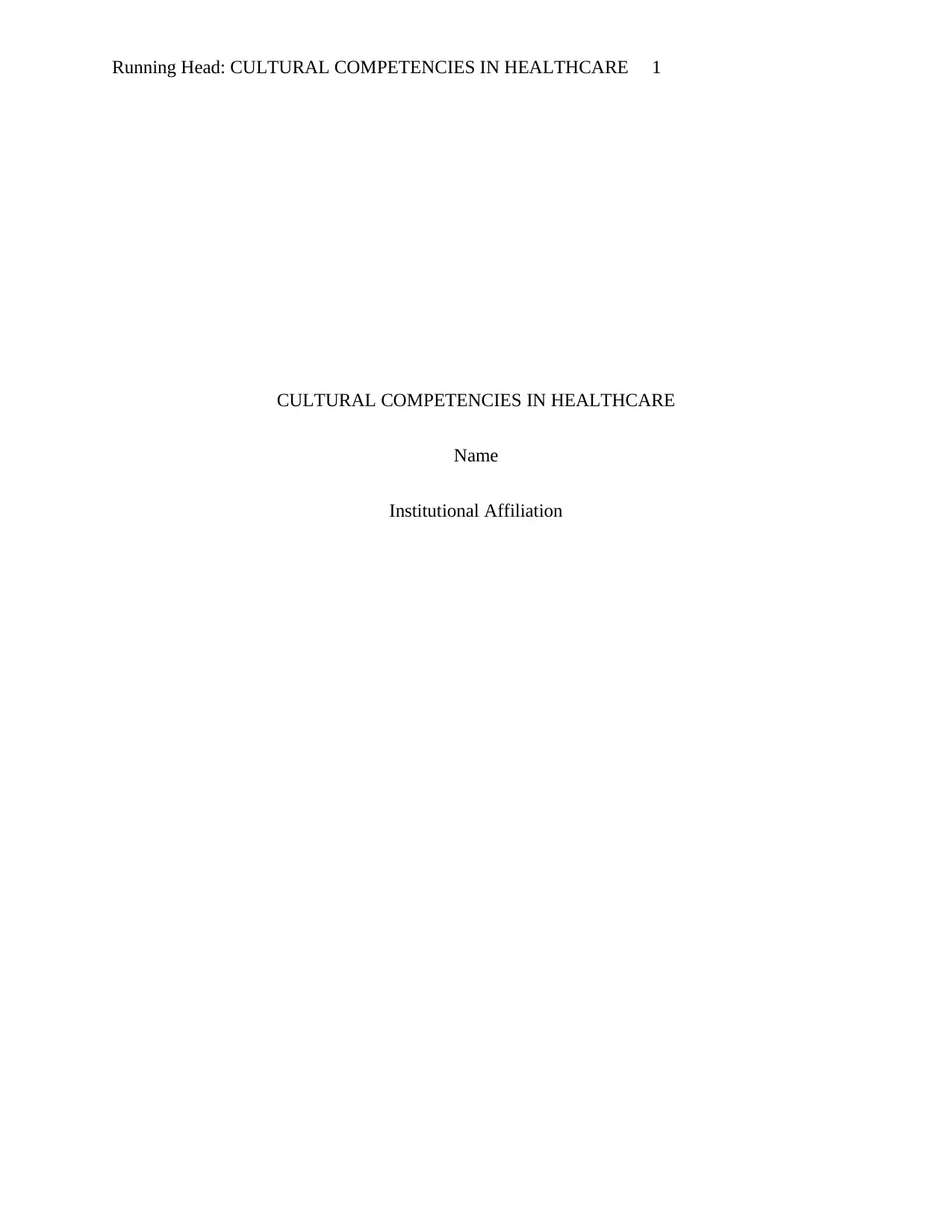
Running Head: CULTURAL COMPETENCIES IN HEALTHCARE 1
CULTURAL COMPETENCIES IN HEALTHCARE
Name
Institutional Affiliation
CULTURAL COMPETENCIES IN HEALTHCARE
Name
Institutional Affiliation
Paraphrase This Document
Need a fresh take? Get an instant paraphrase of this document with our AI Paraphraser
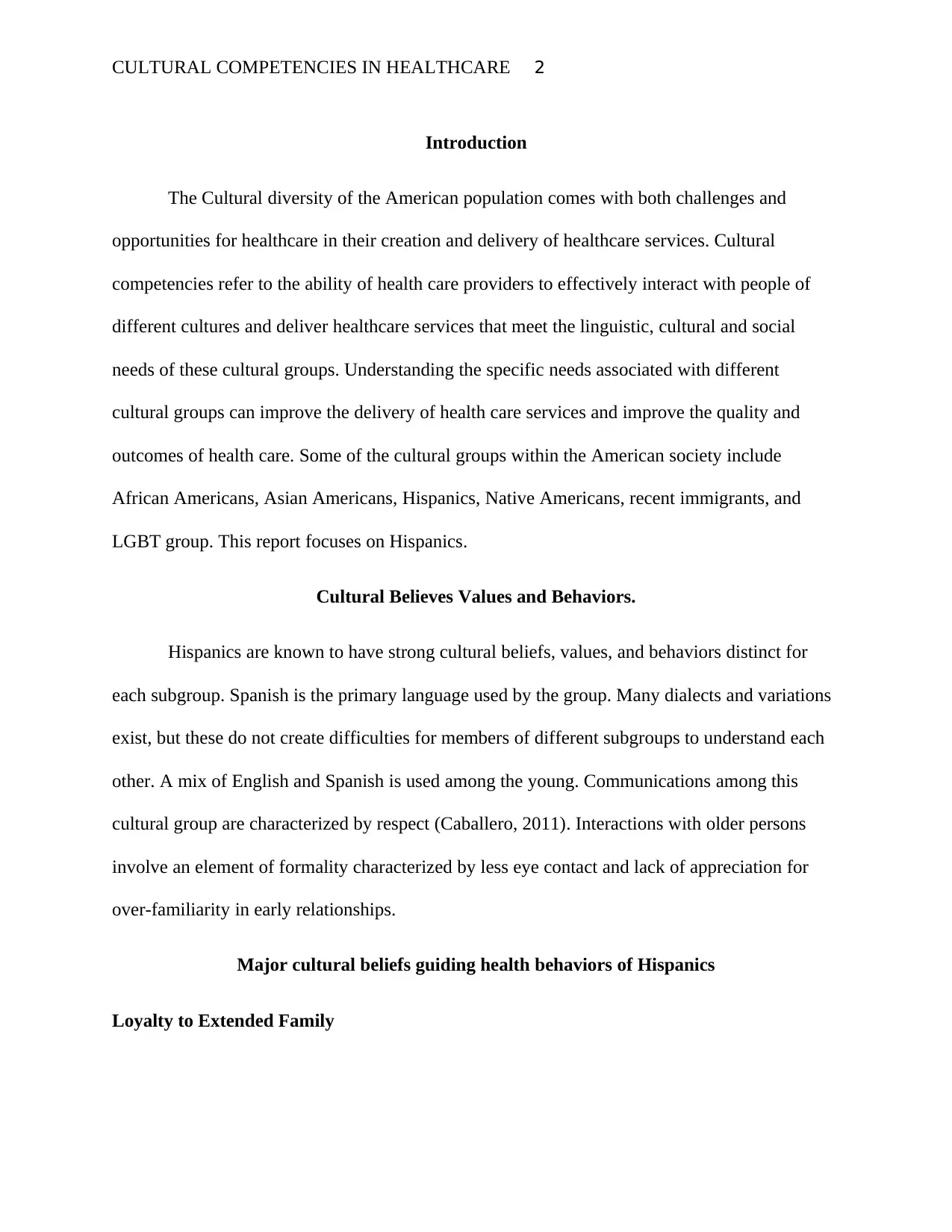
CULTURAL COMPETENCIES IN HEALTHCARE 2
Introduction
The Cultural diversity of the American population comes with both challenges and
opportunities for healthcare in their creation and delivery of healthcare services. Cultural
competencies refer to the ability of health care providers to effectively interact with people of
different cultures and deliver healthcare services that meet the linguistic, cultural and social
needs of these cultural groups. Understanding the specific needs associated with different
cultural groups can improve the delivery of health care services and improve the quality and
outcomes of health care. Some of the cultural groups within the American society include
African Americans, Asian Americans, Hispanics, Native Americans, recent immigrants, and
LGBT group. This report focuses on Hispanics.
Cultural Believes Values and Behaviors.
Hispanics are known to have strong cultural beliefs, values, and behaviors distinct for
each subgroup. Spanish is the primary language used by the group. Many dialects and variations
exist, but these do not create difficulties for members of different subgroups to understand each
other. A mix of English and Spanish is used among the young. Communications among this
cultural group are characterized by respect (Caballero, 2011). Interactions with older persons
involve an element of formality characterized by less eye contact and lack of appreciation for
over-familiarity in early relationships.
Major cultural beliefs guiding health behaviors of Hispanics
Loyalty to Extended Family
Introduction
The Cultural diversity of the American population comes with both challenges and
opportunities for healthcare in their creation and delivery of healthcare services. Cultural
competencies refer to the ability of health care providers to effectively interact with people of
different cultures and deliver healthcare services that meet the linguistic, cultural and social
needs of these cultural groups. Understanding the specific needs associated with different
cultural groups can improve the delivery of health care services and improve the quality and
outcomes of health care. Some of the cultural groups within the American society include
African Americans, Asian Americans, Hispanics, Native Americans, recent immigrants, and
LGBT group. This report focuses on Hispanics.
Cultural Believes Values and Behaviors.
Hispanics are known to have strong cultural beliefs, values, and behaviors distinct for
each subgroup. Spanish is the primary language used by the group. Many dialects and variations
exist, but these do not create difficulties for members of different subgroups to understand each
other. A mix of English and Spanish is used among the young. Communications among this
cultural group are characterized by respect (Caballero, 2011). Interactions with older persons
involve an element of formality characterized by less eye contact and lack of appreciation for
over-familiarity in early relationships.
Major cultural beliefs guiding health behaviors of Hispanics
Loyalty to Extended Family
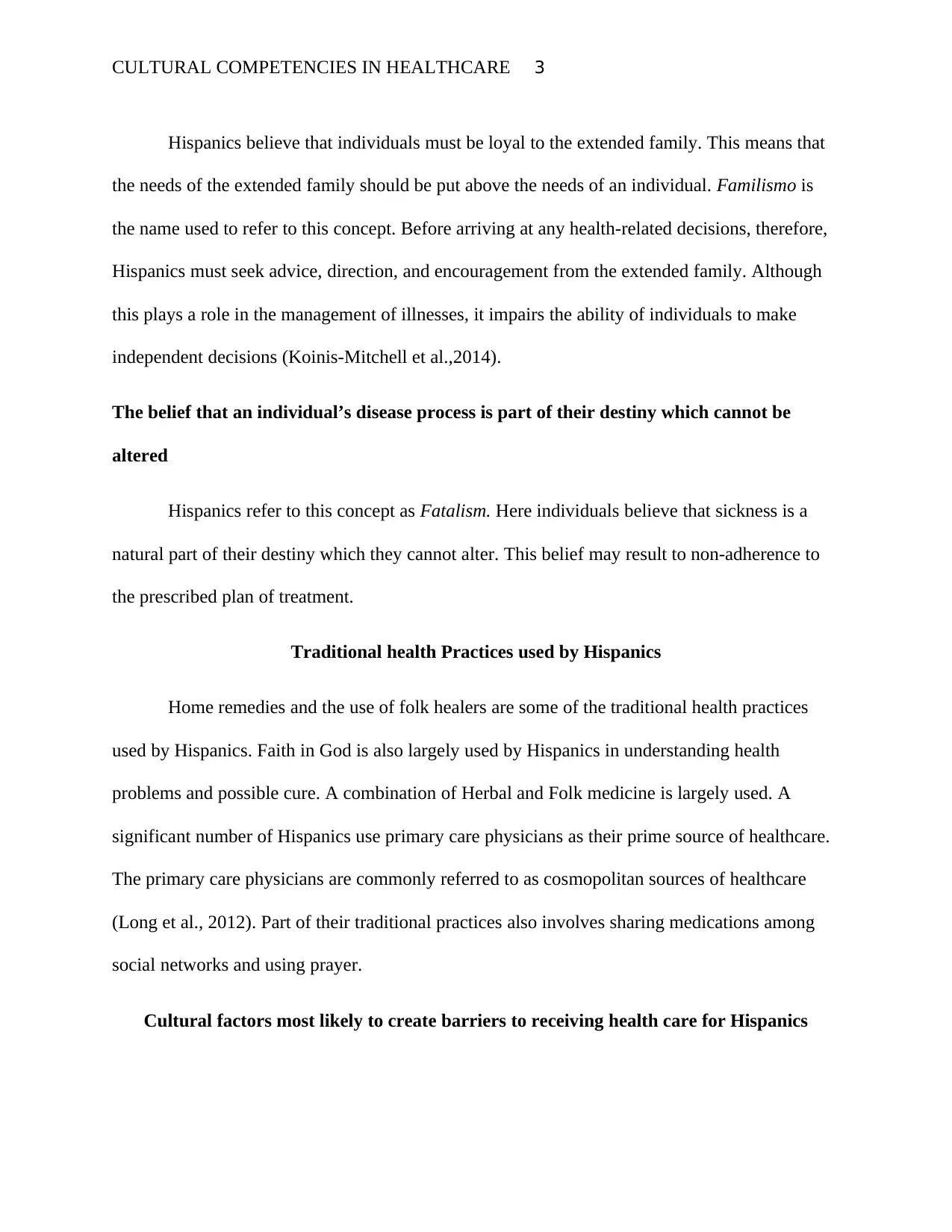
CULTURAL COMPETENCIES IN HEALTHCARE 3
Hispanics believe that individuals must be loyal to the extended family. This means that
the needs of the extended family should be put above the needs of an individual. Familismo is
the name used to refer to this concept. Before arriving at any health-related decisions, therefore,
Hispanics must seek advice, direction, and encouragement from the extended family. Although
this plays a role in the management of illnesses, it impairs the ability of individuals to make
independent decisions (Koinis-Mitchell et al.,2014).
The belief that an individual’s disease process is part of their destiny which cannot be
altered
Hispanics refer to this concept as Fatalism. Here individuals believe that sickness is a
natural part of their destiny which they cannot alter. This belief may result to non-adherence to
the prescribed plan of treatment.
Traditional health Practices used by Hispanics
Home remedies and the use of folk healers are some of the traditional health practices
used by Hispanics. Faith in God is also largely used by Hispanics in understanding health
problems and possible cure. A combination of Herbal and Folk medicine is largely used. A
significant number of Hispanics use primary care physicians as their prime source of healthcare.
The primary care physicians are commonly referred to as cosmopolitan sources of healthcare
(Long et al., 2012). Part of their traditional practices also involves sharing medications among
social networks and using prayer.
Cultural factors most likely to create barriers to receiving health care for Hispanics
Hispanics believe that individuals must be loyal to the extended family. This means that
the needs of the extended family should be put above the needs of an individual. Familismo is
the name used to refer to this concept. Before arriving at any health-related decisions, therefore,
Hispanics must seek advice, direction, and encouragement from the extended family. Although
this plays a role in the management of illnesses, it impairs the ability of individuals to make
independent decisions (Koinis-Mitchell et al.,2014).
The belief that an individual’s disease process is part of their destiny which cannot be
altered
Hispanics refer to this concept as Fatalism. Here individuals believe that sickness is a
natural part of their destiny which they cannot alter. This belief may result to non-adherence to
the prescribed plan of treatment.
Traditional health Practices used by Hispanics
Home remedies and the use of folk healers are some of the traditional health practices
used by Hispanics. Faith in God is also largely used by Hispanics in understanding health
problems and possible cure. A combination of Herbal and Folk medicine is largely used. A
significant number of Hispanics use primary care physicians as their prime source of healthcare.
The primary care physicians are commonly referred to as cosmopolitan sources of healthcare
(Long et al., 2012). Part of their traditional practices also involves sharing medications among
social networks and using prayer.
Cultural factors most likely to create barriers to receiving health care for Hispanics
⊘ This is a preview!⊘
Do you want full access?
Subscribe today to unlock all pages.

Trusted by 1+ million students worldwide
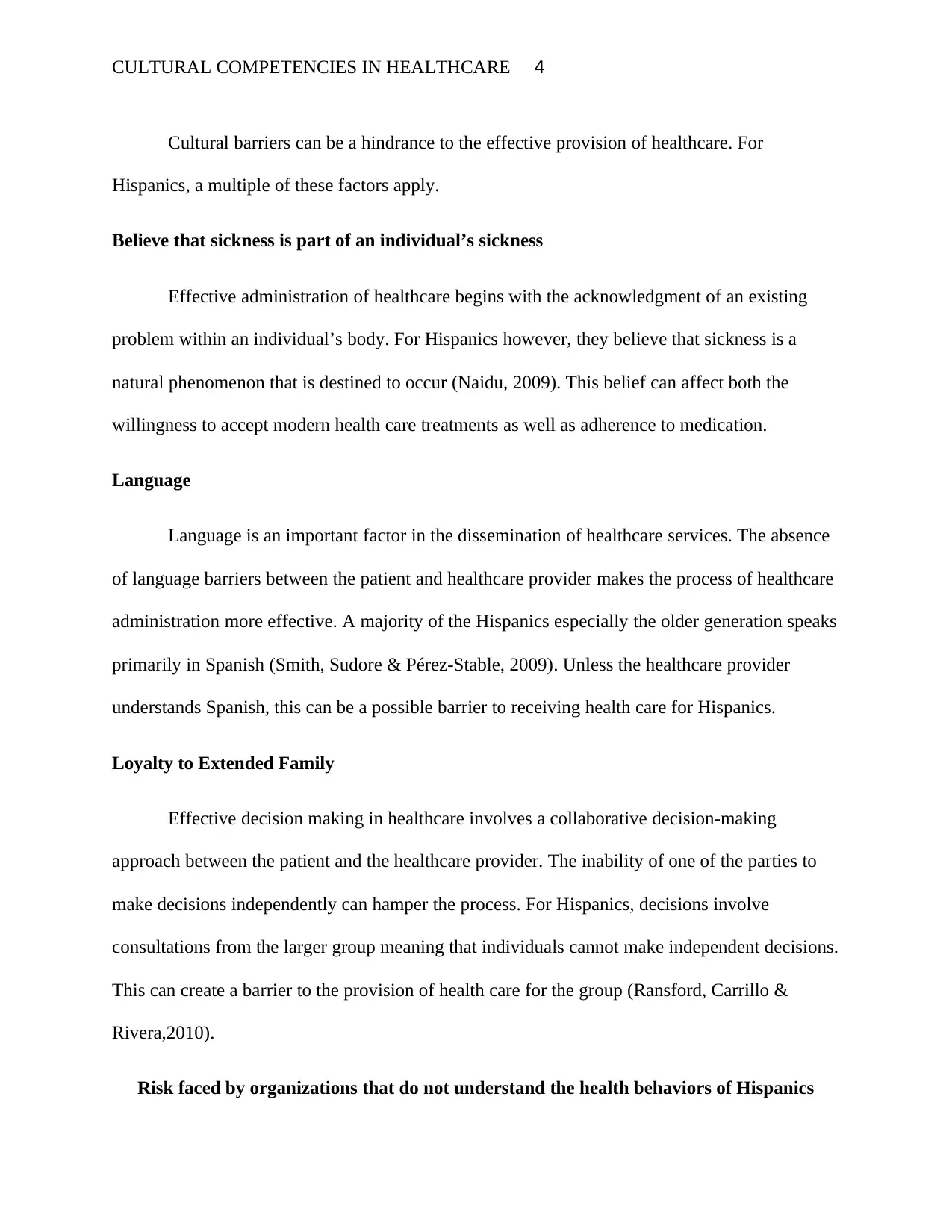
CULTURAL COMPETENCIES IN HEALTHCARE 4
Cultural barriers can be a hindrance to the effective provision of healthcare. For
Hispanics, a multiple of these factors apply.
Believe that sickness is part of an individual’s sickness
Effective administration of healthcare begins with the acknowledgment of an existing
problem within an individual’s body. For Hispanics however, they believe that sickness is a
natural phenomenon that is destined to occur (Naidu, 2009). This belief can affect both the
willingness to accept modern health care treatments as well as adherence to medication.
Language
Language is an important factor in the dissemination of healthcare services. The absence
of language barriers between the patient and healthcare provider makes the process of healthcare
administration more effective. A majority of the Hispanics especially the older generation speaks
primarily in Spanish (Smith, Sudore & Pérez-Stable, 2009). Unless the healthcare provider
understands Spanish, this can be a possible barrier to receiving health care for Hispanics.
Loyalty to Extended Family
Effective decision making in healthcare involves a collaborative decision-making
approach between the patient and the healthcare provider. The inability of one of the parties to
make decisions independently can hamper the process. For Hispanics, decisions involve
consultations from the larger group meaning that individuals cannot make independent decisions.
This can create a barrier to the provision of health care for the group (Ransford, Carrillo &
Rivera,2010).
Risk faced by organizations that do not understand the health behaviors of Hispanics
Cultural barriers can be a hindrance to the effective provision of healthcare. For
Hispanics, a multiple of these factors apply.
Believe that sickness is part of an individual’s sickness
Effective administration of healthcare begins with the acknowledgment of an existing
problem within an individual’s body. For Hispanics however, they believe that sickness is a
natural phenomenon that is destined to occur (Naidu, 2009). This belief can affect both the
willingness to accept modern health care treatments as well as adherence to medication.
Language
Language is an important factor in the dissemination of healthcare services. The absence
of language barriers between the patient and healthcare provider makes the process of healthcare
administration more effective. A majority of the Hispanics especially the older generation speaks
primarily in Spanish (Smith, Sudore & Pérez-Stable, 2009). Unless the healthcare provider
understands Spanish, this can be a possible barrier to receiving health care for Hispanics.
Loyalty to Extended Family
Effective decision making in healthcare involves a collaborative decision-making
approach between the patient and the healthcare provider. The inability of one of the parties to
make decisions independently can hamper the process. For Hispanics, decisions involve
consultations from the larger group meaning that individuals cannot make independent decisions.
This can create a barrier to the provision of health care for the group (Ransford, Carrillo &
Rivera,2010).
Risk faced by organizations that do not understand the health behaviors of Hispanics
Paraphrase This Document
Need a fresh take? Get an instant paraphrase of this document with our AI Paraphraser
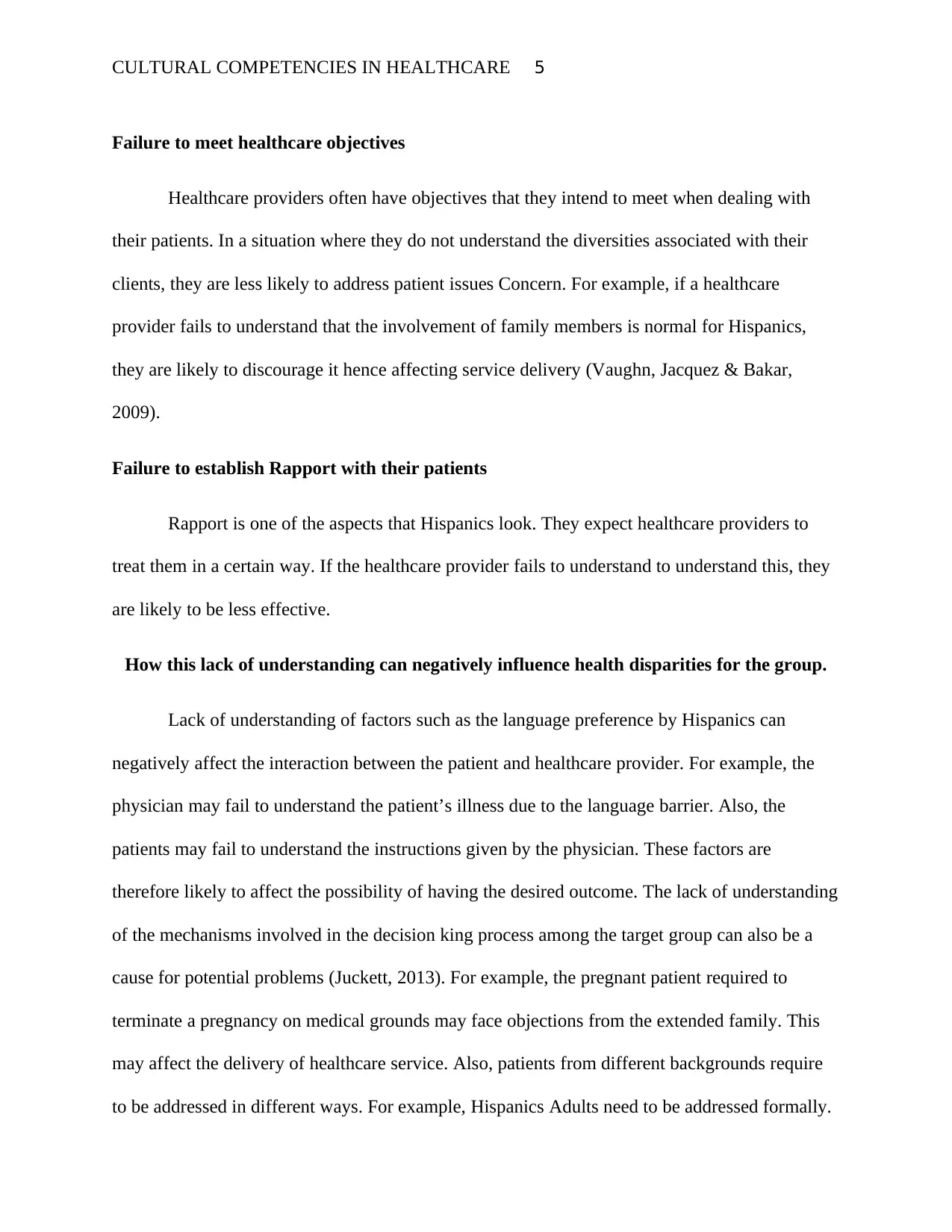
CULTURAL COMPETENCIES IN HEALTHCARE 5
Failure to meet healthcare objectives
Healthcare providers often have objectives that they intend to meet when dealing with
their patients. In a situation where they do not understand the diversities associated with their
clients, they are less likely to address patient issues Concern. For example, if a healthcare
provider fails to understand that the involvement of family members is normal for Hispanics,
they are likely to discourage it hence affecting service delivery (Vaughn, Jacquez & Bakar,
2009).
Failure to establish Rapport with their patients
Rapport is one of the aspects that Hispanics look. They expect healthcare providers to
treat them in a certain way. If the healthcare provider fails to understand to understand this, they
are likely to be less effective.
How this lack of understanding can negatively influence health disparities for the group.
Lack of understanding of factors such as the language preference by Hispanics can
negatively affect the interaction between the patient and healthcare provider. For example, the
physician may fail to understand the patient’s illness due to the language barrier. Also, the
patients may fail to understand the instructions given by the physician. These factors are
therefore likely to affect the possibility of having the desired outcome. The lack of understanding
of the mechanisms involved in the decision king process among the target group can also be a
cause for potential problems (Juckett, 2013). For example, the pregnant patient required to
terminate a pregnancy on medical grounds may face objections from the extended family. This
may affect the delivery of healthcare service. Also, patients from different backgrounds require
to be addressed in different ways. For example, Hispanics Adults need to be addressed formally.
Failure to meet healthcare objectives
Healthcare providers often have objectives that they intend to meet when dealing with
their patients. In a situation where they do not understand the diversities associated with their
clients, they are less likely to address patient issues Concern. For example, if a healthcare
provider fails to understand that the involvement of family members is normal for Hispanics,
they are likely to discourage it hence affecting service delivery (Vaughn, Jacquez & Bakar,
2009).
Failure to establish Rapport with their patients
Rapport is one of the aspects that Hispanics look. They expect healthcare providers to
treat them in a certain way. If the healthcare provider fails to understand to understand this, they
are likely to be less effective.
How this lack of understanding can negatively influence health disparities for the group.
Lack of understanding of factors such as the language preference by Hispanics can
negatively affect the interaction between the patient and healthcare provider. For example, the
physician may fail to understand the patient’s illness due to the language barrier. Also, the
patients may fail to understand the instructions given by the physician. These factors are
therefore likely to affect the possibility of having the desired outcome. The lack of understanding
of the mechanisms involved in the decision king process among the target group can also be a
cause for potential problems (Juckett, 2013). For example, the pregnant patient required to
terminate a pregnancy on medical grounds may face objections from the extended family. This
may affect the delivery of healthcare service. Also, patients from different backgrounds require
to be addressed in different ways. For example, Hispanics Adults need to be addressed formally.
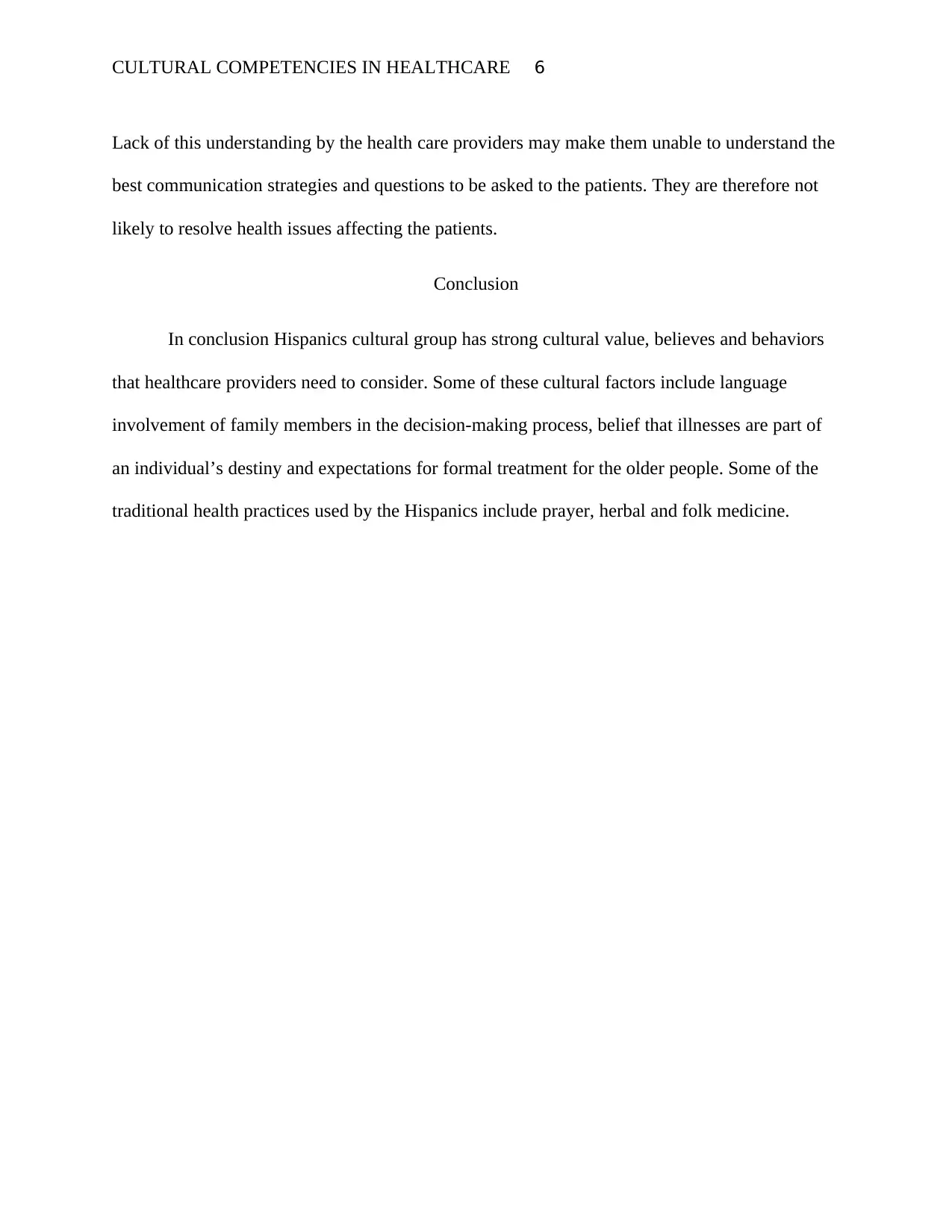
CULTURAL COMPETENCIES IN HEALTHCARE 6
Lack of this understanding by the health care providers may make them unable to understand the
best communication strategies and questions to be asked to the patients. They are therefore not
likely to resolve health issues affecting the patients.
Conclusion
In conclusion Hispanics cultural group has strong cultural value, believes and behaviors
that healthcare providers need to consider. Some of these cultural factors include language
involvement of family members in the decision-making process, belief that illnesses are part of
an individual’s destiny and expectations for formal treatment for the older people. Some of the
traditional health practices used by the Hispanics include prayer, herbal and folk medicine.
Lack of this understanding by the health care providers may make them unable to understand the
best communication strategies and questions to be asked to the patients. They are therefore not
likely to resolve health issues affecting the patients.
Conclusion
In conclusion Hispanics cultural group has strong cultural value, believes and behaviors
that healthcare providers need to consider. Some of these cultural factors include language
involvement of family members in the decision-making process, belief that illnesses are part of
an individual’s destiny and expectations for formal treatment for the older people. Some of the
traditional health practices used by the Hispanics include prayer, herbal and folk medicine.
⊘ This is a preview!⊘
Do you want full access?
Subscribe today to unlock all pages.

Trusted by 1+ million students worldwide
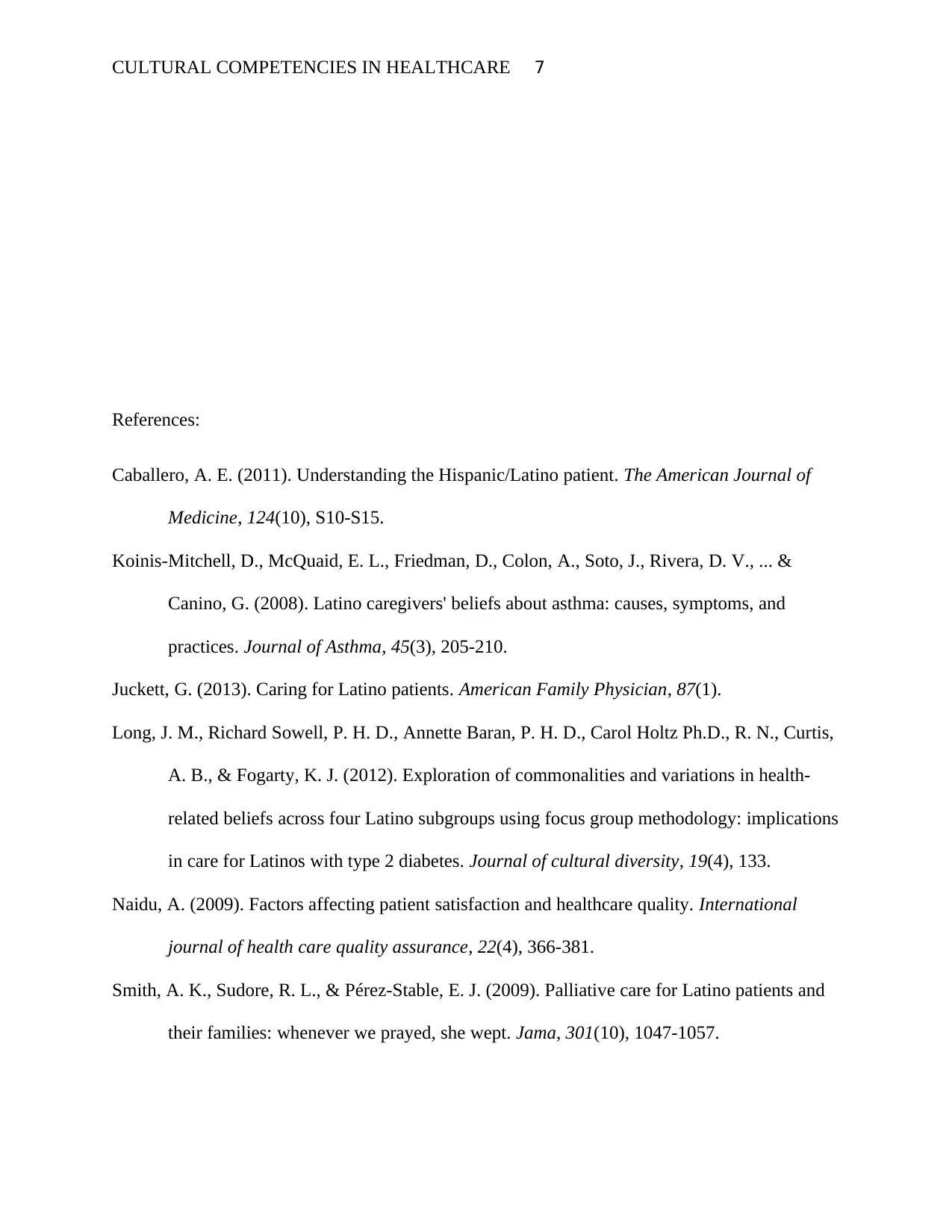
CULTURAL COMPETENCIES IN HEALTHCARE 7
References:
Caballero, A. E. (2011). Understanding the Hispanic/Latino patient. The American Journal of
Medicine, 124(10), S10-S15.
Koinis-Mitchell, D., McQuaid, E. L., Friedman, D., Colon, A., Soto, J., Rivera, D. V., ... &
Canino, G. (2008). Latino caregivers' beliefs about asthma: causes, symptoms, and
practices. Journal of Asthma, 45(3), 205-210.
Juckett, G. (2013). Caring for Latino patients. American Family Physician, 87(1).
Long, J. M., Richard Sowell, P. H. D., Annette Baran, P. H. D., Carol Holtz Ph.D., R. N., Curtis,
A. B., & Fogarty, K. J. (2012). Exploration of commonalities and variations in health-
related beliefs across four Latino subgroups using focus group methodology: implications
in care for Latinos with type 2 diabetes. Journal of cultural diversity, 19(4), 133.
Naidu, A. (2009). Factors affecting patient satisfaction and healthcare quality. International
journal of health care quality assurance, 22(4), 366-381.
Smith, A. K., Sudore, R. L., & Pérez-Stable, E. J. (2009). Palliative care for Latino patients and
their families: whenever we prayed, she wept. Jama, 301(10), 1047-1057.
References:
Caballero, A. E. (2011). Understanding the Hispanic/Latino patient. The American Journal of
Medicine, 124(10), S10-S15.
Koinis-Mitchell, D., McQuaid, E. L., Friedman, D., Colon, A., Soto, J., Rivera, D. V., ... &
Canino, G. (2008). Latino caregivers' beliefs about asthma: causes, symptoms, and
practices. Journal of Asthma, 45(3), 205-210.
Juckett, G. (2013). Caring for Latino patients. American Family Physician, 87(1).
Long, J. M., Richard Sowell, P. H. D., Annette Baran, P. H. D., Carol Holtz Ph.D., R. N., Curtis,
A. B., & Fogarty, K. J. (2012). Exploration of commonalities and variations in health-
related beliefs across four Latino subgroups using focus group methodology: implications
in care for Latinos with type 2 diabetes. Journal of cultural diversity, 19(4), 133.
Naidu, A. (2009). Factors affecting patient satisfaction and healthcare quality. International
journal of health care quality assurance, 22(4), 366-381.
Smith, A. K., Sudore, R. L., & Pérez-Stable, E. J. (2009). Palliative care for Latino patients and
their families: whenever we prayed, she wept. Jama, 301(10), 1047-1057.
Paraphrase This Document
Need a fresh take? Get an instant paraphrase of this document with our AI Paraphraser
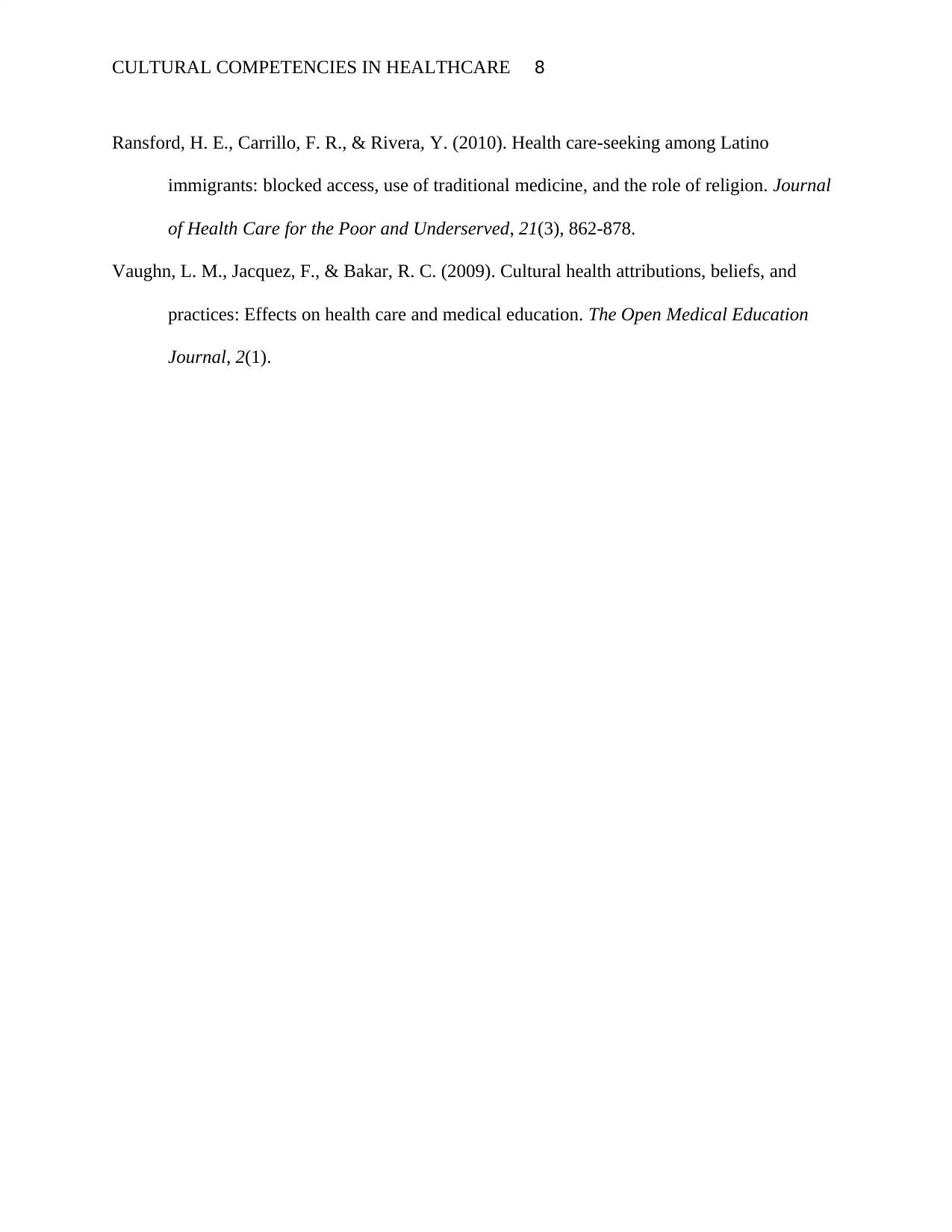
CULTURAL COMPETENCIES IN HEALTHCARE 8
Ransford, H. E., Carrillo, F. R., & Rivera, Y. (2010). Health care-seeking among Latino
immigrants: blocked access, use of traditional medicine, and the role of religion. Journal
of Health Care for the Poor and Underserved, 21(3), 862-878.
Vaughn, L. M., Jacquez, F., & Bakar, R. C. (2009). Cultural health attributions, beliefs, and
practices: Effects on health care and medical education. The Open Medical Education
Journal, 2(1).
Ransford, H. E., Carrillo, F. R., & Rivera, Y. (2010). Health care-seeking among Latino
immigrants: blocked access, use of traditional medicine, and the role of religion. Journal
of Health Care for the Poor and Underserved, 21(3), 862-878.
Vaughn, L. M., Jacquez, F., & Bakar, R. C. (2009). Cultural health attributions, beliefs, and
practices: Effects on health care and medical education. The Open Medical Education
Journal, 2(1).
1 out of 8
Related Documents
Your All-in-One AI-Powered Toolkit for Academic Success.
+13062052269
info@desklib.com
Available 24*7 on WhatsApp / Email
![[object Object]](/_next/static/media/star-bottom.7253800d.svg)
Unlock your academic potential
Copyright © 2020–2026 A2Z Services. All Rights Reserved. Developed and managed by ZUCOL.





